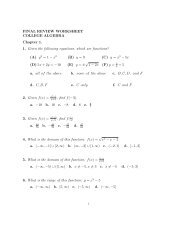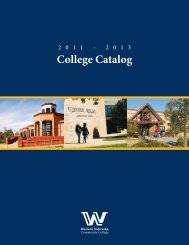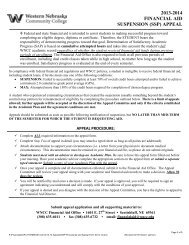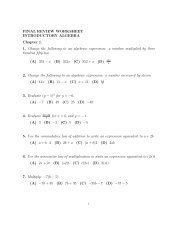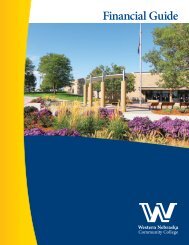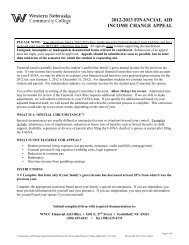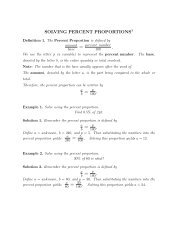WNCC 2010 Self-Study Report - Western Nebraska Community ...
WNCC 2010 Self-Study Report - Western Nebraska Community ...
WNCC 2010 Self-Study Report - Western Nebraska Community ...
You also want an ePaper? Increase the reach of your titles
YUMPU automatically turns print PDFs into web optimized ePapers that Google loves.
their contact information at semester starts or at registration time. They also have the ability to<br />
update their information throughout the academic year to ensure that the College has current<br />
emergency contact information.<br />
Emergency notifications, campus closings, and weather alerts also appear as messages on the<br />
College website. The switchboard phone is programmed so that a response message can be<br />
placed on it to inform callers of the situation during a crisis or emergency situation.<br />
Hazardous Materials and Waste Disposal<br />
<strong>WNCC</strong> recognizes the need to provide a comprehensive learning experience for students, which<br />
involves offering course and laboratory experiences that sometimes use hazardous materials.<br />
The Physical Plant Director has the responsibility of overseeing compliance with hazardous waste<br />
disposal and reporting guidelines. Instructors in science, art, theatre, photography, journalism,<br />
and automotive areas are trained to store and use potentially hazardous materials, and they safely<br />
store waste materials until they are collected for eventual disposition. Instructors or area<br />
managers report waste accumulation totals monthly. The Director submits an EPA report monthly<br />
on waste collected and disposed of, besides quarterly EPA reports for fog and sand trap services.<br />
For chemicals used in laboratory instruction, <strong>WNCC</strong> maintains master manuals of Material Data<br />
Safety Sheets (MSDS), and copies of individual MSDS sheets are posted in all areas where<br />
chemicals are stored or used. Biology and chemistry faculty members have been trained in<br />
laboratory safety, including the proper disposal of products or byproducts related to laboratory<br />
instruction. Students are also taught about basic laboratory safety in courses that include<br />
laboratory sessions. In 2008, a new chemical storage structure behind the main building was<br />
completed at Scottsbluff; all chemicals are now stored and monitored in that location.<br />
Campus Security<br />
<strong>WNCC</strong> contracts with a private security firm (SOS) to provide security services on the Scottsbluff<br />
campus seven days a week between the hours of 10:00 p.m. and 7:00 a.m. When not patrolling<br />
the Scottsbluff campus, the security officers are stationed at the residential facilities. The officers<br />
do not have law enforcement authority but work through the Scottsbluff Police Department for<br />
necessary assistance. The security officers are also trained in first aid, CPR, and the proper use<br />
of the latest generation of automatic defibrillators.<br />
The Alliance and Sidney campuses do not use private security services. Instead, local law<br />
enforcement departments provide security and law enforcement functions. Both campuses have<br />
excellent working relationships with local law enforcement agencies at the city and county level.<br />
Residence halls are monitored by Residence Life Coordinators between 7 a.m. and 10 p.m. Each<br />
residence hall remains locked 24 hours a day, with access controlled by a card. Students entering<br />
residence halls between 10 p.m. and 7 a.m. must show a valid <strong>WNCC</strong> identification card. Visitors<br />
at the residence halls must sign in at the reception desk and show a picture ID. An entrance log is<br />
maintained, and a surveillance camera scans the front entrance.<br />
<strong>WNCC</strong> publishes annually a Campus Security and Safety <strong>Report</strong>, following the requirements of<br />
the Jeanne Clery Act, the federal Student Right-To-Know and Campus Security Act of 1990, and<br />
the Higher Education Amendments of 1992. The report is made available on the College website,<br />
in the Student Services Department at the Scottsbluff campus, and in the administrative office<br />
Page 114<br />
<strong>Western</strong> <strong>Nebraska</strong> <strong>Community</strong> College



